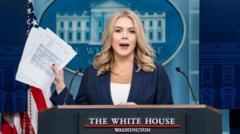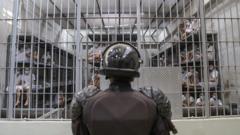An important First Amendment victory for press freedom as the Trump administration is ordered to allow Associated Press reporters back to presidential events.
Court Orders White House to Reinstate AP Journalists' Access

Court Orders White House to Reinstate AP Journalists' Access
US judge rules against White House restrictions on media freedom
The Associated Press (AP) won a significant legal victory on Tuesday when a US judge mandated the Trump administration to restore access for its journalists to presidential events. This ruling comes after a contentious dispute arose over the White House's attempt to redefine the Gulf of Mexico as the "Gulf of America." District Judge Trevor McFadden stated that the administration's action was a violation of the First Amendment, emphasizing that freedom of speech and the press must be upheld.
The controversy began when the AP refused to conform to the administration's preferred terminology in its coverage, leading to the White House barring AP journalists from attending press opportunities, including those on Air Force One. Judge McFadden paused the implementation of his ruling until Sunday, allowing a window for the administration's lawyers to file an appeal. In his ruling, he highlighted that the government cannot deny press access based on differing viewpoints once it opens its venues to some journalists.
An AP spokesperson expressed gratitude for the decision, stating that it reinforced the foundational right of the public and press to communicate freely without government-imposed restrictions. Other advocacy organizations for press freedoms also lauded the decision, arguing that the AP's exclusion was retaliatory and unconstitutional.
The lawsuit had named three high-ranking Trump officials—Press Secretary Karoline Leavitt, Chief of Staff Susie Wiles, and Deputy Chief of Staff Taylor Budowich—who were accused of infringing upon press freedoms. The administration, however, contended that the AP was not entitled to any exclusive access, especially since the title change was part of an executive order that framed the Gulf as a significant American geographical feature.
Despite the administration's changes, the AP has committed to using "Gulf of Mexico" in its reporting, reflecting its stance against the government's rename efforts. Following the imposition of restrictions, the AP remained resolute in challenging what it considered unlawful barriers to their access to critical press events.
The controversy began when the AP refused to conform to the administration's preferred terminology in its coverage, leading to the White House barring AP journalists from attending press opportunities, including those on Air Force One. Judge McFadden paused the implementation of his ruling until Sunday, allowing a window for the administration's lawyers to file an appeal. In his ruling, he highlighted that the government cannot deny press access based on differing viewpoints once it opens its venues to some journalists.
An AP spokesperson expressed gratitude for the decision, stating that it reinforced the foundational right of the public and press to communicate freely without government-imposed restrictions. Other advocacy organizations for press freedoms also lauded the decision, arguing that the AP's exclusion was retaliatory and unconstitutional.
The lawsuit had named three high-ranking Trump officials—Press Secretary Karoline Leavitt, Chief of Staff Susie Wiles, and Deputy Chief of Staff Taylor Budowich—who were accused of infringing upon press freedoms. The administration, however, contended that the AP was not entitled to any exclusive access, especially since the title change was part of an executive order that framed the Gulf as a significant American geographical feature.
Despite the administration's changes, the AP has committed to using "Gulf of Mexico" in its reporting, reflecting its stance against the government's rename efforts. Following the imposition of restrictions, the AP remained resolute in challenging what it considered unlawful barriers to their access to critical press events.





















